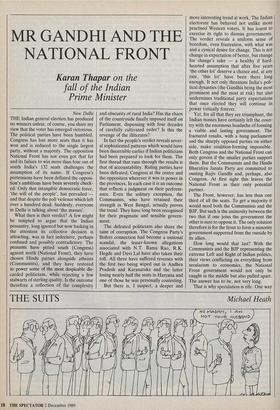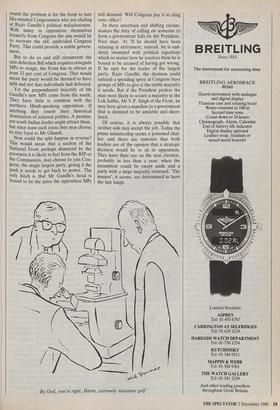MR GANDHI AND THE NATIONAL FRONT
Karan Thapar on the
fall of the Indian Prime Minister
New Delhi THE Indian general election has produced no winners unless, of course, you share my view that the voter has emerged victorious. The political parties have been humbled. Congress has lost more seats than it has won and is reduced to the single largest party, without a majority. The opposition National Front has not even got that far and its failure to win more than four out of south India's 132 seats challenges the assumption of its name. If Congress's pretensions have been deflated the opposi- tion's ambitions have been severely check- ed. Only that intangible democratic force, `the will of the people', has prevailed and that despite the poll violence which left over a hundred dead. Suddenly, everyone in Delhi is talking about 'the masses'.
What then is their verdict? A few might be tempted to argue that the Indian peasantry, long ignored but now basking in the attention its collective decision is attracting, was in fact indecisive, perhaps confused and possibly contradictory. The peasants have pitted south (Congress) against north (National Front), they have chosen Hindu parties alongside atheists (Communists), and they have restored to power some of the most despicable dis- carded politicians, while rejecting a few stalwarts of sterling quality. Is the outcome therefore a reflection of the complexity and obscurity of rural India? Has the chaos of the countryside finally imposed itself on Parliament, dispensing with four decades of carefully cultivated order? Is this the revenge of the illiterates?
In fact the people's verdict reveals sever- al sophisticated patterns which would have been discernible earlier if Indian politicians had been prepared to look for them. The first thread that runs through the results is that of accountability. Ruling parties. have been defeated; Congress at the centre and the opposition wherever it was in power in the provinces. In each case it is an outcome that reflects a judgment on their perform- ance. Even the solitary exception, the Communists, who have retained their strength in West Bengal, actually proves the trend. They have long been recognised for their pragmatic and sensible govern- ment.
The defeated politicians also share the taint of corruption. The Congress Party's Bofors connection had become a national scandal, the lesser-known allegations associated with N.T. Rama Rao, R.K. Hegde and Devi Lal have also taken their toll. All three have suffered reverses with the first two being wiped out in Andhra Pradesh and Karanataka and the latter losing nearly half the seats in Haryana and one of those he was personally contesting.
But there is, I suspect, a deeper and more interesting trend at work. The Indian electorate has behaved not unlike more practised Western voters. It has learnt to exercise its right to dismiss governments. The verdict reveals a uniform sense of boredom, even frustration, with what was and a cynical desire for change. This is not change in expectation of better, but change for change's sake — a healthy if hard- hearted assumption that after five years `the other lot' deserve a chance and, at any rate, 'this lot' have been there long enough. It not only threatens India's poli- tical dynasties (the Gandhis being the most prominent and the most at risk) but also undermines traditional party expectations that once elected they will continue in power virtually forever.
Yet, for all that they are triumphant, the Indian masses have certainly left the coun- try with the enormous headache of forming a viable and lasting government. The fractured results, with a hung parliament and the sharply opposed parties on either side, make coalition-forming impossible. Both Congress and the National Front can only govern if the smaller parties support them. But the Communists and the Hindu Bharatiya Janata Party are committed to ousting Rajiv Gandhi and, perhaps, also Congress. At first sight this leaves the National Front as their only potential partner.
The Front, however, has less than one third of all the seats. To get a majority it would need both the Communists and the BJP. But such is the animosity between the two that if one joins the government the other is sure to oppose it. The only solution therefore is for the front to form a minority government supported from the outside by its allies.
How long would that last? With the Communists and the BJP representing the extreme Left and Right of Indian politics, their views conflicting on everything from secularism to economics, the National Front government would not only be caught in the middle but also pulled apart. The answer has to be, not very long.
That is why speculation is rife. One way round the problem is for the front to lure like-minded Congressmen who are chafing at Rajiv Gandhi's political maladroitness. With many in opposition themselves formerly from Congress the aim would be to recreate the old, undivided Congress Party. This could provide a stable govern- ment.
But to do so and still circumvent the anti-defection Bill which requires renegade MPs to resign, the Front has to attract at least 33 per cent of Congress. That would mean the party would be deemed to have split and not that individuals had defected.
Yet the preponderent majority of Mr Gandhi's new MPs come from the south. They have little is common with the northern Hindi-speaking opposition. If anything they resent their historical domination of national politics. A promin- ent south Indian leader might attract them, but since none such exists they may choose to stay loyal to Mr Ghandi.
Now could the split happen in reverse? This would mean that a section of the National Front perhaps dismayed by the pressures it is likely to feel from the BJP or the Communists, may choose to join Con- gress, the single largest party, giving it the push it needs to get back to power. The only hitch is that Mr Gandhi's head is bound to be the price the opposition MPs will demand. Will Congress pay it to cling onto office?
In these uncertain and shifting circum- stances the duty of calling on someone to form a government falls on the President. Poor man. At 78 he should have been relaxing in retirement; instead, he is sud- denly swamped with political equations which no matter how he resolves them he is bound to be accused of having got wrong. If he opts for the leader of the largest party, Rajiv Gandhi, the decision could unleash a spending spree as Congress buys groups of MPs to give it the stable majority it needs. But if the President prefers the man most likely to secure a majority in the Lok Sabha, Mr V.P. Singh of the Front, he may have given a mandate to a government that is destined to be unstable and short- lived.
Of course, it is always possible that neither side may accept the job. Today the prime ministership seems a poisoned chal- lice and there are rumours that both leaders are of the opinion that a strategic decision would be to sit in opposition. They have their eye on the next election, probably in less than a year, when the incumbent could be swept aside and a party with a large majority returned. 'The masses', it seems, are determined to have the last laugh.
By God, you're right, Harris, extremely miniature golf'











































































 Previous page
Previous page